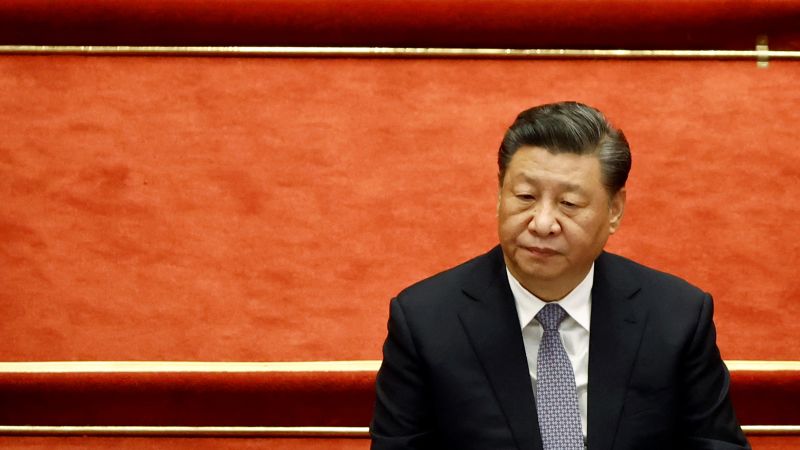Opinion: Why Xi can’t quit zero-Covid

Editor’s Note: Yanzhong Huang is a senior fellow for global health at the Council on Foreign Relations and a professor at Seton Hall University School of Diplomacy and International Relations, specializing in Asia. He is the author of “Toxic Politics: China’s Environmental Health Crisis and Its Challenge to the Chinese State.” The views expressed here are his own. Read more opinion on CNN.
Those hoping China relaxes its zero-Covid policy would have been deeply disappointed with Vice Premier Sun Chunlan’s loud and clear signal that an end was nowhere near in sight, during a visit to virus hotspot Shanghai last week.
China, she declared, would be clinging to its “dynamic zero-Covid” strategy “without hesitation or wavering.”
Unsurprisingly, we are seeing Shanghai – well known for its targeted and flexible approach to the pandemic – now turning to draconian measures to control the virus.
In addition to multiple rounds of city-wide mass testing and lockdown of 25 million residents, it is relocating close contacts and sub-close contacts to other cities. And building perhaps the world’s largest quarantine center, with 40,000 beds.
Covid-positive kids under quarantine were separated from their parents. On Wednesday, a person in a hazmat suit reportedly intentionally killed a corgi in the street, for fear of the dog spreading the virus after the owner was taken into quarantine after testing positive.
The country’s central leadership no longer tolerates iconoclastic policy implementation – instead, local governments are instructed to “pull out all stops to control the spread of the virus in the shortest time.”
The new directive – which apparently was instructed by President Xi Jinping – favors heavy-handed pandemic control measures, such as mass PCR testing, forced quarantines and city-wide lockdowns.
It marks a new chapter in China’s zero-Covid policy which began two years ago, after the situation was brought under control in Wuhan. In order to secure what China had achieved, while buying time for mass vaccination, it has relied on mass testing and aggressive contact tracing to identify new cases and their close contacts for isolation and quarantine, before resetting local cases to zero.
Until last summer, that strategy proved successful in sustaining an extremely low level of infection. But it began to face problems with the spread of the Delta variant. The arrival of the Omicron wave this spring makes such an elimination strategy even less feasible.
In late March, the government began to tweak the strategy by approving rapid antigen test kits at home and issuing new guidelines that no longer require the hospitalization of asymptomatic or mild cases.
This gave the impression that the country had begun to favor a more targeted and flexible approach that would eventually help it exit from zero-Covid. But the recent surge of Covid-19 cases in Shanghai highlighted the failure of a targeted approach in containing the spread of the new variant.
Now, the renewed emphasis on zero-Covid also reinforces the perverse incentive structure in China’s political hierarchy.
With power concentrated in the pinnacle of the system, local government officials concerned about their career advancement rush to jump onto the policy bandwagon of zero-Covid – demonstrating their loyalty to Xi and his favored policy agenda.
The incentive becomes much stronger for the politically ambitious who covet a seat in the Chinese Communist Party Central Committee, or, even better, the all-powerful Politburo Standing Committee, where reshuffle is to occur in this year’s 20th Party Congress. Xi is believed to be seeking an unprecedented third term, contrary to longstanding limits on the longevity of the party secretary’s power.
At the national level, city after city has rushed to mass testing, even in the absence of cases. Lockdown measures were imposed even though cases are in single digits. Reminiscent of the nationwide mobilization of healthcare workers during the Wuhan outbreak, more than 38,000 medical staff from 15 provinces were deployed to Shanghai to support its fight against the virus.
While Xi hoped to minimize the cost of a zero-Covid strategy, this renewed campaign will rapidly and exponentially take a heavy economic toll. Economically, it further suppresses domestic consumption, exacerbates disruption to the supply chain, and encourages the exodus of investors.
Socially, the single-minded pursuit of zero-Covid has ripple effects, such as lack of access to run-of-the mill and emergency healthcare. As more people are victimized by the policy, popular discontent toward zero-Covid could go viral. Fear-induced behavior (as shown in panic buying in Shanghai) would threaten sociopolitical stability – which could disrupt the leadership transition ahead of the congress.
Epidemiologically, by shielding the population from the virus and making vaccination a back-burner issue, China would sustain its huge immunity gap with the rest of the world – which paradoxically also makes the exit from zero-Covid harder to justify. Instead of living with the virus, Chinese people may have to live with an extremely costly policy.
So what is the breaking point in China’s zero-Covid policy? As Zeng Guang, a top government health adviser said last summer, China would start to open and coexist with the virus when the cost exceeded the benefits.
What he did not foresee is that weighing of the cost and benefits of the policy is now highly politicized. Under China’s performance-based legitimacy, pivoting away from zero-Covid due to the high socioeconomic cost would undermine Xi’s personal leadership right at the moment he is seeking a third term. And he has tied his personal interest to the policy.
Indeed, a recent Xinhua article reiterated that Xi was “personally issuing commands and personally arranging deployments” in China’s battle against Covid-19.
Furthermore, abandoning the policy would also hurt the legitimacy of the regime since it can no longer claim China’s political system is superior to the western ones. In January 2021, Xi said: “Judging from how this pandemic is being handled by different leaderships and [political] systems … [we can] clearly see who has done better.”
The party, and Xi himself, have benefited greatly from curbing the spread of the virus within China despite the initial mishandling of the Wuhan outbreak.
A recent article published in a Shenzhen newspaper framed the debate between zero-Covid and coexistence with the virus as “fundamentally” a competition between political systems. If China manages to use a zero-Covid approach to avoid large-scale outbreaks when all other nations opt to live with the virus, it will make the arguments about the resilience and resourcefulness of the Chinese state much more convincing.
With the political stakes so high, the tremendous cost associated with the policy becomes a secondary concern, and zero-Covid becomes a by-all-means and at-all-cost approach.
Unless the top leadership changes its zero-Covid mentality, the policy is here to stay. In the words of a nationalist blogger, China should “prepare to live with zero-Covid for at least ten years.”


